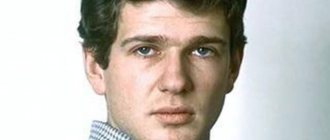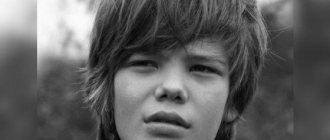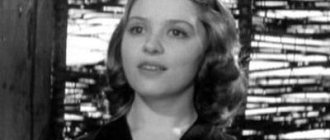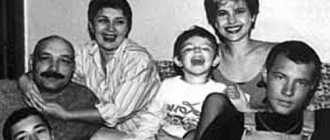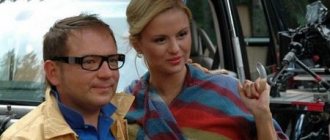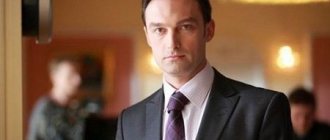Today the hero of our story will be the popular Hollywood actor Eric Roberts. During his career, he starred in more than 250 films. It is also interesting that his younger sister is the world-famous Julia Roberts, with whom, however, Eric currently does not communicate. So, we invite you to take a closer look at the actor’s career and personal life.
Eric Roberts: biography
The future Hollywood celebrity was born on April 18, 1956 in the city of Biloxi, located in the US state of Mississippi. His father Walter was a director and ran a creative laboratory. My mother was not a professional actress, but she was always passionate about the theater. Little Eric suffered from a stutter, but as soon as he learned a text by heart, this illness disappeared without a trace. An attentive father quickly noticed this feature of his son and created a television drama especially for him called “Little Pioneers.” In this project, Eric made his debut on screen, playing the role of a crippled boy.
Interview with Julia Roberts (video)
On October 28, famous American film actress and Oscar winner Julia Roberts celebrates her 50th birthday. Today she is one of the highest paid and sought-after actresses. In addition, Julia Roberts topped the list of the most beautiful people on the planet 12 times according to People magazine. However, she herself does not consider herself an outstanding person and still remembers those complexes that poisoned her life in her youth.
Julia Roberts in her youth
The actress does not like to remember her childhood. Her parents divorced when she was 4 years old, and her stepfather turned out to be a sadist and tyrant who turned the children's lives into a real nightmare. When her brother, Eric Roberts, became a famous actor, he shared his memories: “In those days, the most terrible thing for me was the thought: “What is he doing with his sisters?” But I was so humiliated, my body hurt so much from the beatings that I was terrified to conduct an investigation, much less complain to my mother. This monster man destroyed something in us. We grew up among violence and evil. We were angry and humiliated. Probably everything that happened later in my life and in Julia’s life was a consequence of this. We were inexorably self-destructing...”
Julia never approved of her brother making their family secrets public, but she confirmed that their early years were bleak. Problems in the family were aggravated by misunderstanding and bullying by peers. At school she was considered ugly and teased for her huge mouth, tall height and excessive thinness. At the age of 13, Julia began working as a waitress to earn pocket money, but above all, to spend less time at home.
Actress at the beginning of her film career
Who knows whether she would have become an actress or not if it weren’t for her brother, who became interested in acting. It was he who helped his shy, repressed and insecure sister try her hand at cinema. Following her brother, she went to New York, where scouts from modeling agencies immediately noticed her. Julia spent the money she earned from photo sessions on classes with a speech therapist and acting courses. Eric Roberts, who was already actively acting at that time, helped her find her place in Hollywood. Arriving there in 1987, two years later she received a Golden Globe for her role in the film Steel Magnolias. And soon her brother could no longer compete with her in fees and popularity.
Still from the film *Pretty Woman*, 1990
1990s became her finest hour in cinema. After the film “Pretty Woman,” Julia Roberts gained worldwide popularity, and her fees rose to millions. Success was cemented by the films “In Bed with the Enemy”, “Dying Young”, “My Best Friend’s Wedding”, “Notting Hill” and “Runaway Bride”. And in the early 2000s. Julia Roberts has become one of the highest paid stars in Hollywood. She was awarded an Oscar for her role in Erin Brockovich, and for her participation in the film Mona Lisa Smile she received a record $25 million.
Julia Roberts in the movie *Pretty Woman*, 1990
Julia Roberts became the first actress to grace the cover of Vogue and was officially voted the most beautiful woman on the planet 12 times. Despite the incredible popularity, love of the audience and numerous awards, she herself continued to worry about her appearance. If she had come to terms with being tall, her large mouth, which journalists called “sensual,” still seemed ugly to her, and she called her gorgeous mop of hair nothing more than “fucking straw.”
Julia Roberts
One of the most beautiful women on the planet
At 50, the actress admits: “I wish I could rewind my life and start it with more self-confidence. It seems to me that many women could do with increasing their self-esteem, which is what I sincerely wish for them.”
Julia Roberts in the film *The Mexican*, 2001
Julia Roberts
Julia Roberts hasn't been appearing in films very often lately. She decided to change the pace of life and devote more time to her family - after all, at the age of 37, she gave birth to long-awaited twins, whose upbringing the actress took very seriously. “With the birth of children, life became slower, longer - because it was more eventful. Maybe that’s why the children I had after 18 years of work were regarded as a reward for these 18 years of stress,” says the actress.
Julia Roberts
Her children don’t know that their mother is a world-class star, and they don’t watch films with her participation; for them, she wants to remain just a mother: “Somehow we all tried not to focus the children’s attention on my profession... Mom is mom . I try to evaluate myself sensibly: as an ordinary woman with an unusual occupation. There is nothing outstanding about me, it’s my profession that puts me in italics.”
One of the highest paid Hollywood stars
The actress with her husband, cameraman Daniel Moder
She sees her main achievement not in multimillion-dollar earnings and not in worldwide popularity. The actress admits: “Luxury for me, and luxury in general in the modern world, is the opportunity to do what you want, do what you want, live according to your own choice and desire... I’m probably a downshifter by nature. Not in the sense of one who is content with little, but one who does not want to achieve, who does not recognize the category of goal, who allows himself the luxury of not being aware of fashion for anything. Who shares the concept of “anti-vacation” - remember in Douglas Copeland’s “Generation X”: you work for a year, earn money for another year and do nothing at all for a year - grind grass, travel around India. That's for me."
One of the most beautiful women on the planet
Julia Roberts is still irresistible, charming, witty and natural in everything. On October 28, Hollywood's biggest smile turned 50 years old. True, in the case of Julia, this is nothing more than a number in a passport. 10 interesting facts about one of the highest paid actresses in the world - in the regular Viva section!
1. Julia Roberts is a strict mother.
“My children and I have complete mutual understanding and a very warm relationship, it’s true. But I wouldn’t say that my husband and I spoil them. Children even think that we are strict parents. Recently I realized that we never watch movies or TV when we get together. We read books aloud, discuss news, and cook something. We try to show them different sides of life."
2. Julia Roberts fought with Meryl Streep.
“I remember I was scared to imagine what my mother would say when she watched the film “August: Osage County.” The scene where I attack Meryl Streep's character took a whole day to film. I beat poor Meryl several times, we were all bruised and scratched. I moaned and asked how she was holding up. But the great Meryl was like a soldier at the front: she did not complain, courageously applied ice to the bruised places and entered the battle again. She's much more resilient than me."
3. Julia Roberts only uses mascara when it comes to cosmetics.
“I don’t like aggressive, very bright makeup and in everyday life I often limit myself to just mascara. I don’t understand why highlighters and corrective palettes are needed. In my opinion, they haven’t come up with anything better than makeup without makeup. At home, on my dressing table I have face cream and makeup remover milk. And, of course, my makeup bag is never short of sunscreens for the face and body. The skin doesn’t need extra ultraviolet light.”
4. Julia Roberts looks better now than in her youth.
“The fact that I look like this, genes certainly played a role, my parents are outwardly very interesting people. But I’ll tell you something else: I looked worse when I was younger. And now I have many consultants who share beauty secrets. In general, the older a woman gets, the more her inner world is reflected on her face.”
5. Picky about roles.
“I have always been selective in terms of roles. For example, I turned down projects when I was in my twenties because the scripts made me think, “Is this movie right for me, or is it low-grade crap?” This period lasted for two years, and I did not regret at all that I took a time out. I rethought many things, began to take only those roles that inspire me. I think it’s better when people say, “She’s on screen a little,” than, “I think she’s on screen too much.”
6. Julia Roberts believes that children should be had at an adult age.
“I had children when I was almost 40 years old, and with their arrival my life became slower and more eventful. No matter what the doctors say, I think it makes sense to have children as late as possible. Having become a parent in adulthood, you perceive them not as a huge responsibility, not as a drastic life change, but as a reward!”
7. Not without pride.
“I prefer not to share my experiences. It's typical Southern pride - I'm from Georgia. And among us southerners, Scarlett O'Hara lives in all of us: the very fact of failure seems humiliating to us. And we are proudly silent about our failures and disappointments. I don’t argue: not my best trait.”
Eric Anthony Roberts is an American actor who appears in films and on television, winner of one Oscar nomination and three Golden Globe nominations, the older brother of a Hollywood star. Eric was born on April 18, 1956 in Biloxi, Mississippi. Later, when the family was already living in Atlanta, two more children were born - sisters Lisa and Julia. Father Walter Roberts worked as a director and director of a theater studio, mother Betty Lou was an actor.
As a child, Eric suffered from a stutter, but while reading poetry, the boy’s illness disappeared. The father decided to help his son and began giving the child small roles in his own productions. At the age of 5, Eric first appeared on camera in the television play “Little Pioneers,” which was staged by his father. The boy made his final decision about an acting career at the age of 11 after watching the film “Goodbye, Mister Chips.”
In 1970, the Roberts family broke up, and her mother left for another man. Eric was on his father's side and was very upset about his parents' divorce. Having contacted a group of older guys, the young man began to abuse alcohol and drugs. At the same time, Eric was already playing in his father’s troupe, demonstrating extraordinary acting abilities. In 1972, Walter decided to send his son to the best theater school - London's Royal Academy of Drama, away from his dysfunctional friends.
Studying changed the young man; Eric abandoned his addictions and began a career. After graduating from school in England, Eric entered the American Theater Academy and began performing on Broadway, making his debut in the play Burn This. Success followed the actor: Roberts played more than 100 roles on the stage.
Eric Roberts in his youth
The future famous actor’s real interest in cinema arose at the age of 11 after watching the film “Goodbye Mr. Chips.” The magnificent performance of Robert Donat impressed Eric so much that the choice of his future profession was predetermined. Since Roberts Sr.'s job required relocation, the entire family often traveled from state to state. During this time, Eric managed to take part in several productions on the amateur stage. The relationship between Roberts' parents gradually deteriorated, and they quarreled a lot. Trying to escape from the family drama, Eric became friends with older guys who got him addicted to drugs.
When Roberts Jr. was 14 years old, his mother left his father for another man. Eric could never forgive her for this act. The divorce of his parents became a great stress for the boy. Embittered with the whole world, he began to get involved in fights, which resulted in him ending up in the police custody more than once. The only outlet left for Eric was the theater. The father clearly saw excellent acting skills in his son, and therefore decided to give him an appropriate education. So, at the age of sixteen, Eric went to England to study at the prestigious Royal Academy of Dramatic Art.
Excerpt characterizing Roberts, Eric
While Rostov was making these considerations and sadly driving away from the sovereign, Captain von Toll accidentally drove into the same place and, seeing the sovereign, drove straight up to him, offered him his services and helped him cross the ditch on foot. The Emperor, wanting to rest and feeling unwell, sat down under an apple tree, and Tol stopped next to him. From afar, Rostov saw with envy and remorse how von Tol spoke to the sovereign for a long time and with fervor, and how the sovereign, apparently crying, closed his eyes with his hand and shook hands with Tol. “And I could be in his place?” Rostov thought to himself and, barely holding back tears of regret for the fate of the sovereign, in complete despair he drove on, not knowing where and why he was going now. His despair was the greater because he felt that his own weakness was the cause of his grief. He could... not only could, but he had to drive up to the sovereign. And this was the only opportunity to show the sovereign his devotion. And he didn’t use it... “What have I done?” he thought. And he turned his horse and galloped back to the place where he had seen the emperor; but there was no one behind the ditch anymore. Only carts and carriages were driving. From one furman, Rostov learned that the Kutuzov headquarters was located nearby in the village where the convoys were going. Rostov went after them. The guard Kutuzov walked ahead of him, leading horses in blankets. Behind the bereytor there was a cart, and behind the cart walked an old servant, in a cap, a sheepskin coat and with bowed legs. - Titus, oh Titus! - said the bereitor. - What? - the old man answered absentmindedly. - Titus! Go threshing. - Eh, fool, ugh! – the old man said, spitting angrily. Some time passed in silent movement, and the same joke was repeated again. At five o'clock in the evening the battle was lost at all points. More than a hundred guns were already in the hands of the French. Przhebyshevsky and his corps laid down their weapons. Other columns, having lost about half of the people, retreated in frustrated, mixed crowds. The remnants of the troops of Lanzheron and Dokhturov, mingled, crowded around the ponds on the dams and banks near the village of Augesta. At 6 o'clock only at the Augesta dam the hot cannonade of the French alone could still be heard, who had built numerous batteries on the descent of the Pratsen Heights and were hitting our retreating troops. In the rearguard, Dokhturov and others, gathering battalions, fired back at the French cavalry that was pursuing ours. It was starting to get dark. On the narrow dam of Augest, on which for so many years the old miller sat peacefully in a cap with fishing rods, while his grandson, rolling up his shirt sleeves, was sorting out silver quivering fish in a watering can; on this dam, along which for so many years the Moravians drove peacefully on their twin carts loaded with wheat, in shaggy hats and blue jackets and, dusted with flour, with white carts leaving along the same dam - on this narrow dam now between wagons and cannons, under the horses and between the wheels crowded people disfigured by the fear of death, crushing each other, dying, walking over the dying and killing each other only so that, after walking a few steps, to be sure. also killed. Every ten seconds, pumping up the air, a cannonball splashed or a grenade exploded in the middle of this dense crowd, killing and sprinkling blood on those who stood close. Dolokhov, wounded in the arm, on foot with a dozen soldiers of his company (he was already an officer) and his regimental commander, on horseback, represented the remnants of the entire regiment. Drawn by the crowd, they pressed into the entrance to the dam and, pressed on all sides, stopped because a horse in front fell under a cannon, and the crowd was pulling it out. One cannonball killed someone behind them, the other hit in front and splashed Dolokhov’s blood. The crowd moved desperately, shrank, moved a few steps and stopped again. Walk these hundred steps, and you will probably be saved; stand for another two minutes, and everyone probably thought he was dead. Dolokhov, standing in the middle of the crowd, rushed to the edge of the dam, knocking down two soldiers, and fled onto the slippery ice that covered the pond. “Turn off,” he shouted, jumping on the ice that was cracking under him, “turn off!” - he shouted at the gun. - It’s holding!... The ice was holding it, but it was bending and cracking, and it was obvious that not only under a gun or a crowd of people, but under him alone, it would now collapse. They looked at him and huddled close to the shore, not daring to step on the ice yet. The regiment commander, standing on horseback at the entrance, raised his hand and opened his mouth, addressing Dolokhov. Suddenly one of the cannonballs whistled so low over the crowd that everyone bent down. Something splashed into the wet water, and the general and his horse fell into a pool of blood. No one looked at the general, no one thought to raise him. - Let's go on the ice! walked on the ice! Let's go! gate! can't you hear! Let's go! - suddenly, after the cannonball hit the general, countless voices were heard, not knowing what or why they were shouting. One of the rear guns, which was entering the dam, turned onto the ice. Crowds of soldiers from the dam began to run to the frozen pond. The ice cracked under one of the leading soldiers and one foot went into the water; he wanted to recover and fell waist-deep. The nearest soldiers hesitated, the gun driver stopped his horse, but shouts were still heard from behind: “Get on the ice, come on, let’s go!” let's go!" And screams of horror were heard from the crowd. The soldiers surrounding the gun waved at the horses and beat them to make them turn and move. The horses set off from the shore. The ice holding the foot soldiers collapsed in a huge piece, and about forty people who were on the ice rushed forward and backward, drowning one another. The cannonballs still whistled evenly and splashed onto the ice, into the water and, most often, into the crowd covering the dam, ponds and shore. On Pratsenskaya Mountain, in the very place where he fell with the flagpole in his hands, Prince Andrei Bolkonsky lay, bleeding, and, without knowing it, moaned a quiet, pitiful and childish groan. By evening he stopped moaning and became completely quiet. He didn't know how long his oblivion lasted. Suddenly he felt alive again and suffering from a burning and tearing pain in his head. “Where is it, this high sky, which I did not know until now and saw today?” was his first thought. “And I didn’t know this suffering either,” he thought. - Yes, I didn’t know anything until now. But where am I? He began to listen and heard the sounds of approaching horses and the sounds of voices speaking French. He opened his eyes. Above him was again the same high sky with floating clouds rising even higher, through which a blue infinity could be seen. He did not turn his head and did not see those who, judging by the sound of hooves and voices, drove up to him and stopped. The horsemen who arrived were Napoleon, accompanied by two adjutants. Bonaparte, driving around the battlefield, gave the last orders to strengthen the batteries firing at the Augesta Dam and examined the dead and wounded remaining on the battlefield. - De beaux hommes! [Beauties!] - said Napoleon, looking at the killed Russian grenadier, who, with his face buried in the ground and the back of his head blackened, was lying on his stomach, throwing one already numb arm far away. – Les munitions des pieces de position sont epuisees, sire! [There are no more battery charges, Your Majesty!] - said at that time the adjutant, who arrived from the batteries that were firing at Augest. “Faites avancer celles de la reserve, [Have it brought from the reserves,” said Napoleon, and, having driven off a few steps, he stopped over Prince Andrei, who was lying on his back with the flagpole thrown next to him (the banner had already been taken by the French, like a trophy) . “Voila une belle mort, [This is a beautiful death,”] said Napoleon, looking at Bolkonsky. Prince Andrei realized that this was said about him, and that Napoleon was saying this. He heard the one who said these words called sire. But he heard these words as if he heard the buzzing of a fly. Not only was he not interested in them, but he did not even notice them, and immediately forgot them. His head was burning; he felt that he was emanating blood, and he saw above him the distant, high and eternal sky. He knew that it was Napoleon - his hero, but at that moment Napoleon seemed to him such a small, insignificant person in comparison with what was now happening between his soul and this high, endless sky with clouds running across it. He didn’t care at all at that moment, no matter who stood above him, no matter what they said about him; He was only glad that people were standing over him, and he only wished that these people would help him and return him to life, which seemed so beautiful to him, because he understood it so differently now. He mustered all his strength to move and make some sound. He weakly moved his leg and produced a pitying, weak, painful groan. - A! “He’s alive,” said Napoleon. – Raise this young man, ce jeune homme, and take him to the dressing station! Having said this, Napoleon rode further towards Marshal Lan, who, taking off his hat, smiling and congratulating him on his victory, drove up to the emperor. Prince Andrei did not remember anything further: he lost consciousness from the terrible pain that was caused to him by being placed on a stretcher, jolts while moving, and probing the wound at the dressing station. He woke up only at the end of the day, when he was united with other Russian wounded and captured officers and carried to the hospital. During this movement he felt somewhat fresher and could look around and even speak. The first words he heard when he woke up were the words of the French escort officer, who hurriedly said: “We must stop here: the emperor will pass by now; it will give him pleasure to see these captive gentlemen. “There are so many prisoners these days, almost the entire Russian army, that he probably got bored with it,” said another officer. - Well, however! This one, they say, is the commander of the entire guard of Emperor Alexander,” said the first, pointing to a wounded Russian officer in a white cavalry uniform. Bolkonsky recognized Prince Repnin, whom he had met in St. Petersburg society. Next to him stood another, 19-year-old boy, also a wounded cavalry officer. Bonaparte, galloping up, stopped his horse. - Who is the eldest? - he said when he saw the prisoners. They named the colonel, Prince Repnin. – Are you the commander of the cavalry regiment of Emperor Alexander? - asked Napoleon. “I commanded a squadron,” answered Repnin. “Your regiment honestly fulfilled its duty,” said Napoleon. “The praise of a great commander is the best reward for a soldier,” said Repnin. “I give it to you with pleasure,” said Napoleon. -Who is this young man next to you? Prince Repnin named Lieutenant Sukhtelen. Looking at him, Napoleon said, smiling: “II est venu bien jeune se frotter a nous.” [He came young to compete with us.] “Youth doesn’t stop you from being brave,” Sukhtelen said in a breaking voice. “Excellent answer,” said Napoleon. - Young man, you will go far! Prince Andrei, who, to complete the trophy of the captives, was also put forward, in full view of the emperor, could not help but attract his attention. Napoleon apparently remembered that he had seen him on the field and, addressing him, used the same name of the young man - jeune homme, under which Bolkonsky was reflected in his memory for the first time. – Et vous, jeune homme? Well, what about you, young man? - he turned to him, - how do you feel, mon brave? Despite the fact that five minutes before this, Prince Andrei could say a few words to the soldiers carrying him, he now, directly fixing his eyes on Napoleon, was silent... All the interests that occupied Napoleon seemed so insignificant to him at that moment, so petty seemed to him his hero himself, with this petty vanity and joy of victory, in comparison with that high, fair and kind sky that he saw and understood - that he could not answer him. And everything seemed so useless and insignificant in comparison with the strict and majestic structure of thought that was caused in him by the weakening of his strength from the bleeding, suffering and the imminent expectation of death. Looking into the eyes of Napoleon, Prince Andrei thought about the insignificance of greatness, about the insignificance of life, the meaning of which no one could understand, and about the even greater insignificance of death, the meaning of which no one living could understand and explain. The emperor, without waiting for an answer, turned away and, driving away, turned to one of the commanders: “Let them take care of these gentlemen and take them to my bivouac; let my doctor Larrey examine their wounds. Goodbye, Prince Repnin,” and he, moving his horse, galloped on. There was a radiance of self-satisfaction and happiness on his face. The soldiers who brought Prince Andrei and removed from him the golden icon they found, hung on his brother by Princess Marya, seeing the kindness with which the emperor treated the prisoners, hastened to return the icon. Prince Andrei did not see who put it on again or how, but on his chest, above his uniform, he suddenly found an icon on a small gold chain. “It would be good,” thought Prince Andrei, looking at this icon, which his sister hung on him with such feeling and reverence, “it would be good if everything were as clear and simple as it seems to Princess Marya. How nice it would be to know where to look for help in this life and what to expect after it, there, beyond the grave! How happy and calm I would be if I could now say: Lord, have mercy on me!... But to whom will I say this? Either the power is indefinite, incomprehensible, which I not only cannot address, but which I cannot express in words - great all or nothing,” he said to himself, “or is it that God who is sewn up here, in this palm, Princess Marya? Nothing, nothing is true, except the insignificance of everything that is clear to me, and the greatness of something incomprehensible, but most important! The stretcher started moving. With each push he again felt unbearable pain; the feverish state intensified, and he began to become delirious. Those dreams of his father, wife, sister and future son and the tenderness that he experienced on the night before the battle, the figure of the small, insignificant Napoleon and the high sky above all this, formed the main basis of his feverish ideas. A quiet life and calm family happiness in Bald Mountains seemed to him. He was already enjoying this happiness when suddenly little Napoleon appeared with his indifferent, limited and happy look at the misfortune of others, and doubts and torment began, and only the sky promised peace. By morning, all the dreams mixed up and merged into the chaos and darkness of unconsciousness and oblivion, which, in the opinion of Larrey himself, Doctor Napoleon, were much more likely to be resolved by death than by recovery. “C’est un sujet nerveux et bilieux,” said Larrey, “il n’en rechappera pas.” [This is a nervous and bilious man, he will not recover.] Prince Andrei, among other hopeless wounded, was handed over to the care of the residents. At the beginning of 1806, Nikolai Rostov returned on vacation. Denisov was also going home to Voronezh, and Rostov persuaded him to go with him to Moscow and stay in their house. At the penultimate station, having met a comrade, Denisov drank three bottles of wine with him and, approaching Moscow, despite the potholes of the road, he did not wake up, lying at the bottom of the relay sleigh, near Rostov, which, as it approached Moscow, came more and more to impatience.
Accident
However, after successful work, films with Eric Roberts did not appear on screens for several years. The fact is that in 1981, the actor was in a car accident, as a result of which he received a severe head injury and severely damaged his face. For several days his life literally hung by a thread. After the danger had passed, doctors predicted Roberts would experience partial or even complete paralysis for the rest of his life. However, within a month the actor began to move, and after several operations he got back on his feet and regained almost his previous appearance.
Personal life of Julia Roberts
In the 90s, Julia Roberts became famous not only for her acting.
Her love affairs were the object of close attention of the tabloids, and the paparazzi considered it incredible luck to watch for her in the company of a new contender for her hand and heart. A suicide note was found next to the body. On three pages, Nancy described her relationship with her sister and accused Julia of driving her to suicide. Allegedly, the beautiful Roberts caused her sister irreparable mental trauma with constant ridicule about her excess weight (in her youth, Mots’s weight reached 136 kg; later she lost 70 kg thanks to gastric reduction surgery).
Return to the screens and continuation of film career
Actor Eric Roberts, after surviving the disaster, first appeared on the big screen in 1983. It was a movie called Star 80, in which he played a psychopath named Paul Snyder. Roberts was so convincing in this role that directors henceforth began to invite him exclusively to the roles of negative characters.
The next significant event in the actor’s career was his participation in the filming of a film by Russian director Andrei Konchalovsky called “Runaway Train.” In this film, Eric played brilliantly in the company of Jon Voight and Rebecca De Mornay.
By the end of the 80s, the actor was already a full-fledged Hollywood star. Films starring Eric Roberts at that time included such popular films as “The Cocktail Man,” “Slow Fire,” “Sudden Awakening,” “Red as Blood,” “Best of the Best” and others.
Biography
Born 04/18/1956, Biloxi, Mississippi, USA.
American actor
Oscar winner Golden Globe winner
Childhood, youth
Eric Roberts, full name Eric Anthony Roberts, was born on April 18, 1956 in Biloxi in the US state of Mississippi, in the creative family of director and head of the theater laboratory Walter Roberts. His mother, however, was not a professional actress, but was always interested in acting. As a child, the boy stuttered, but as soon as he learned the text, the stutter disappeared without a trace. An enterprising father noticed this feature of his son and specially staged the television drama “Little Pioneers” for him, where a five-year-old boy made his debut on television in the leading role of a crippled child.
Eric Roberts' true interest in cinema awoke at the age of eleven, when he saw the film "Goodbye, Mister Chips." The talented performance of the brilliant actor Robert Donat, turning from a young man into an old man, bewitched Roberts Jr. and predetermined the choice of his future profession. Traveling with his father around the cities of the state, Eric Roberts successfully performed on the amateur stage for several years. In addition, the guardianship of two younger sisters, Lisa and Julia Roberts, rested on his shoulders. Meanwhile, things were “deplorable” in the family; quarrels and scandals constantly broke out between the parents. The guy tried to distract himself from this by making friends with older guys, who got him addicted to drugs.
His parents separated when Eric Roberts was fourteen years old. The mother left for another man, and her son could never forgive her for this. The guy became angry with everyone and everything, began to get into fights, and ended up with the police. And only the theater still remained for Eric Roberts a great outlet from the everyday bustle. The father, seeing rare acting talents in his son, decided to give him a good education: at the age of sixteen, Eric Roberts became a student at the prestigious English Royal Academy of Dramatic Art.
Beginning of film career
After graduating from the academy, Eric Roberts returned to the USA, where in 1976 he received his first “adult role” in the then not very famous television series “Another World”, which for the aspiring actor nevertheless became an important stage in the biography - a young talent both viewers and critics noticed. And just a couple of years later, in 1978, Eric Roberts started playing the role of Dave in the acclaimed film “The King of the Gypsies” in the “big” cinema.
In the early 1980s, Eric Roberts' film career was marking time; on the one hand, he seemed to be in the movies, but on the other, directors were “afraid” to get involved with the actor because of his dishonest life. Fortunately, Eric Roberts himself quickly understood everything correctly and his final return to cinema, to his favorite business, took place in 1983.
In the film “Star 80” he professionally and extremely convincingly played the psychopath Paul Snyder. This role defined his role, and off we go - directors began regularly inviting Eric Roberts to various negative roles. The actor himself was not very upset about this, because “dangerous guys in the plot are always drawn much more interestingly than positive ones: they have brighter lines, they dress better and drive cool cars.”
A significant event in the film biography of Eric Roberts in the mid-1980s was his collaboration with Russian film experts. The actor played the role of Buck in the masterpiece of the action genre and the progenitor of many subsequent super-grossing action films - “Runaway Train” by Russian director Andrei Konchalovsky, who described his film as follows: “People escaped from prison and got on a passing train. They are free. And the train was accidentally left without a driver. The driver died. And they are rushing at full speed on this train. Are they free or not? So much for the relativity of freedom. It was an honor to direct this script." In the film, Eric Roberts and his partners Jon Voight and Rebecca De Mornay made up a stunningly brilliant film trio.
By the end of the 1980s, Eric Roberts was rightfully considered a Hollywood star. The actor's film credits included highly artistic film images. This is Baker in the film “The Cocktail Man”, and Jacob Ash in the film “Slow Fire”, the slightly arrogant Fred in the film “Sudden Awakening”, Marco Cologhero in “Red as Blood” and Alex Grady in the film “The Best of the Best”.
1990s
The 1990s were marked by increased film popularity in Eric Roberts' filmography. Every year several films starring the famous actor were released. Eric Roberts played the temperamental Frank in The O.C., the eccentric Alex Grady in the sequel to The Best of the Best, Jimmy Evans in Final Analysis, Thomas in The Specialist, and the aloof Grant in Free Fall.
At this time, Eric Roberts most often played psychologically complex roles of scoundrels, which adversely affected the actor’s sensitive nervous system. Constant relationships with women and drug addictions firmly established a bad reputation and aggravated the actor’s business relationships, which were clearly not in his favor.
Eric Roberts, to his credit, made the right decisions at the right time. Having successfully completed a long-term drug treatment program under the supervision of a doctor, in 1997 the actor returned to the screen in a new look. In the famous TV series "C-16: FBI" he played the "good" guy John Olansky.
2000s
At the beginning of the new century, Eric Roberts appeared on television more often than usual; he became practically a serial actor, which, however, did not spoil his film reputation. Roberts played the role of the temperamental Will Butler in the famous comedy series “Klava, come on!”, then played the role of Ken Kramer in the acclaimed television film “CSI: Miami”.
As an actor, Eric Roberts, of course, had long ago reached a level where he could afford to participate only in those films in which he himself was interested in working and brought professional pleasure. The genre did not have a specific meaning. He played with equal success in action films, thrillers, comedies and dramas. Viewers remembered his interesting film works: in Mark David’s drama “Intoxication,” Eric Roberts created the image of Teddy, and brilliantly played in Dennis Dugan’s action comedy “National Security.”
The talent and spectacular appearance of Eric Roberts in the frame was noticed by Russian film publishers. In the Russian-American series directed by Rodion Nakhapetov “Russians in the City of Angels” in 2003, the actor played smuggler Larry “Coyote” Maklovsky, who helps the main character, Russian investigator Andrei Somov, in the investigation. Eric Roberts began a rather long film collaboration with Rodion Nakhapetov. In 2004, the actor made his mark in Nakhapetov’s thriller “Border Blues,” and in the subsequent thriller by the same Rodion Nakhapetov, “Contagion” in 2008, he starred in the role of the serious head physician of the clinic, Dmitry Korzunov.
Eric Roberts had to come to Russia several times to film: “I love Russia, I like working here.” In 2007, Eric Roberts played the main role in the Russian-American film “The Prophet: Mission of the Fifth Angel” directed by Rodney James Hewitt. This time, the actor played the role of American journalist John Lithgow, who has a prophetic gift, which he used during the presidential election.
In the same 2007, Eric Roberts starred both in the role of the strong-willed guy Ivan and in the action film “Close Combat” by Kazakh director Erken Yalgashev. A little earlier, in 2006, he successfully collaborated with Ukrainian cinema, in the film “Aurora” by Ukrainian director Oksana Bayrak, dedicated to the tragedy at the Chernobyl nuclear power plant, Eric Roberts received the role of the strong-willed James.
Personal life
Eric Roberts's personal life has never flowed in a calm direction; it is as complex and confusing as his career. The death of Walter Roberts, the actor's father, to whom he was very attached, was a heavy blow for him. It was then, at twenty-three, that he began dating actress Sandy Denis, who was almost twice his age. He subconsciously looked for a life partner who could become not only his mistress, but also, to some extent, replace his mother.
In the summer of 1981, fate threw Eric Roberts a difficult test: the young actor was in a car accident. The result was a severe traumatic brain injury; half of the actor’s face was a bloody mess. Doctors fought for Roberts’ life for several days, and, fortunately, several operations not only put him back on his feet, but also returned him to his former attractive appearance.
In the second half of the 80s, the actor broke up with Sandy Denis. After several fleeting hobbies, he met Kelly Cunningham, a stormy romance with whom also did not stand the test of time, passionate love gave way to no less passionate hatred. Roberts later called Kelly "the biggest mistake of my life."
In 1991, Eric Roberts got married. His new chosen one was Eliza, an actress with Ukrainian roots, with whom they starred in the 1994 film “Love is a Weapon.” There is peace and grace in the family life of Eric Roberts, he is happy, the actor has been living with Eliza for many years. The actress successfully acts in films and at the same time is Roberts’ personal manager. Their daughter Emma followed in the creative footsteps of her parents; most likely, she also has a great future in Hollywood.
Interesting Facts
Eric Roberts is in love with Russia and enjoys working here.
Eric Roberts starred three times in films by Russian film director Rodion Nakhapetov.
With the help of Eric Roberts, in 1990, his younger sister, Julia Roberts, began acting in films, who quickly became one of the highest-grossing Hollywood actresses. Unfortunately, later the relationship between brother and sister deteriorated: Julia simply could not forgive the criticism addressed to her.
Author – [email protected] @ S.
Sources of information: “Eric Roberts is a star in Moscow,” article, Alena Snezhinskaya, website “dailyshow.ru,” May 2007. “I always feel comfortable in Russia,” article, Ivan Slavinsky, “Interlocutor.” “Hollywood actors, Eric Roberts”, article, site “hollywood.izhnet.ru”, “Eric Roberts was filmed in Moscow”, article, Tatyana Khoroshilova, “Rossiyskaya Gazeta”, May 2007 “Eric Roberts”, article, site “ kinopoisk.ru".
90s
During this period, the actor was very popular. Films with his participation were constantly released on the big screen. Among them are such works as “The O.C.,” “Best of the Best 2,” “Final Analysis,” “The Specialist” and “Free Fall.”
Roberts mostly played the roles of psychopathic villains, which could not but affect his sensitive nervous system. As a result, he became overly interested in drugs and women, which affected the actor’s career and business connections in the most unfavorable way. However, Eric pulled himself together in time: he completed a drug addiction treatment program. And in 1997 he appeared before the audience in a new role for himself as a “good guy”. This was the role of John Olansky in the popular TV series “C-16: FBI”.
Selected filmography
| Year | Russian name | original name | Role | |
| 1977 | With | Another world | Another World | Ted Bancroft |
| 1978 | f | Gypsy Baron | King of the Gypsies | Dave |
| 1981 | f | Tramp | Raggedy Man | Teddy |
| 1983 | f | Playboy Star | Star 80 | Paul Snyder |
| 1984 | f | Pope Greenwich Village | The Pope of Greenwich Village | Poly |
| 1985 | f | Cokemaker | The Coca-Cola Kid | Becker |
| 1985 | f | Runaway Train | Runaway Train | Tank |
| 1986 | f | The girl is not a miss | Nobody's Fool | |
| 1986 | tf | Heat | Slow Burn | Jacob Ash |
| 1988 | tf | Heal the Nation | To Heal a Nation | Ian Scruggs |
| 1989 | f | The best of the best | Best of the Best | Alex Grady |
| 1990 | f | Ambulance | The Ambulance | Josh Baker |
| 1990 | tf | The Missing Capone | The Lost Capone | Al Capone |
| 1990 | tf | Bride of Violence | Bride Of Violence | Sean |
| 1991 | f | Sword | By The Sword | Alex Willard |
| 1992 | tf | Fugitive Among Us | Fugitive Among Us | Kal Harper |
| 1992 | f | Final Analysis | Final Analysis | Jimmy Evans |
| 1993 | f | Free fall | Freefall | Grant |
| 1993 | tf | Love, betrayal and theft | Love, Cheat & Steal | Reno Adams |
| 1993 | f | To Love, Honor and Obey: The Last Mafia Marriage | Love, Honor & Obey: Last Mafia Marriage | Bill |
| 1993 | f | Best of the best 2 | Best Of The Best 2 | Alex Grady |
| 1993 | tf | Journey | Voyage | Freeland |
| 1994 | f | The brutal truth | The Hard Truth | Chandler Etheridge |
| 1994 | f | Specialist | The Specialist | Thomas Leon |
| 1994 | f | Thrill | Sensation | Dr. Barton |
| 1994 | f | Love is a weapon | Love Is A Gun | Jack Hart |
| 1995 | f | Nature of the Beast | The Nature of the Beast | Adrian |
| 1995 | core | End of the icon | End of the Icon | Jack Spain |
| 1995 | f | Immortals | The Immortals | Jack |
| 1995 | tf | Saving light | Saved by the Light | Dennion Brinkley |
| 1996 | tf | Dark Angel | Dark Angel | Walter D'Arcangelo |
| 1996 | f | Prisoners of Heaven | Heaven's Prisoners | Bubba Rock |
| 1996 | f | The verdict of time | Past Perfect | |
| 1996 | f | This is my party | It's My Party | Nick Stark |
| 1996 | f | Cable guy | The Cable Guy | cameo |
| 1997 | V | Public Enemy #1 | Public Enemies | Arthur Dunlop |
| 1996 | tf | Doctor Who | Doctor Who Movie | Master |
| 1997 | mtf | Odyssey | The Odyssey | Eurymachus |
| 1997 | With | Frasier | Frasier | Chet |
| 1997 | With | Oz Prison | Oz | Richard |
| 1998 | V | Prophecy 2 | The Prophecy II | archangel Michael |
| 1998 | f | Destruction process | La Cucaracha | Walter Poole |
| 1999 | tf | Godfather Lansky | Lahsky | Bugsy Segal |
| 1999 | V | Bitter joy | BitterSweet | Mr Venti |
| 1999 | f | Ordered killer | Hitman's Run | John Dugen |
| 1999 | tf | Purgatory | Purgatory | BlackJack Britton |
| 1999 | ms | Spawn | Spawn | Petey |
| 1999 | With | Law & Order: Special Victims Unit | Law & Order: Special Victims Unit | Sam |
| 2000 | f | King's Guards | The King's Guard | Augustus Talbert |
| 2000 | tf | Hypocrite | Sanctimony | lieutenant |
| 2000 | With | Witchblade | Witchblade | Magnifying glass |
| 2001 | With | Rockers | Strange Frequency | Bob Henry |
| 2001 | With | Law & Order: Special Victims Unit | Law & Order: Special Victims Unit | Sam |
| 2001 | With | Law and order. Criminal intent | Law & Order: Criminal Intent | Roy |
| 2001 | With | King of Queens | The King of Queens | Strohmeyer |
| 2001 | tf | Faster than a shadow | Walking Shadow | DeSpain Police Chief |
| 2001 | tf | Dangerous flight | Rough Air: Danger on Flight 534 | First Officer Mike Hogan |
| 2001 | tf | Flying Dutchman | The Flying Dutchman | Sean |
| 2001 | V | death squad | Con Games | Officer Hopkins |
| 2001 | V | Raptor | Raptor | Sheriff Jim Tanner |
| 2002 | f | Dangerous individuals | Endangered Species | Mike Sullivan |
| 2002 | f | Aerobatics | Spun | in the episode |
| 2002—2004 | ms | Justice League | Justice League | Mongul |
| 2002—2005 | With | Klava, come on! | Less Than Perfect | Will Butler |
| 2003 | With | Russians in the city of angels | Russians v Gorode Angelov | Larry 'Coyote' Maklowski |
| 2003 | f | National security | National Security | Nash |
| 2004 | With | Sex in another city | The L Word | Gabriel McCutcheon |
| 2004 | f | Six | Six: The Mark Unleashed | Dallas |
| 2004 | dock | My date with Drew | My Date with Drew | cameo |
| 2004 | V | Border Blues | Border Blues | Coyote Larry |
| 2005 | core | Spit | Spit | Jack |
| 2005 | core | Twice | The Double | Stephen Edwards |
| 2005 | V | Junior pilot | Junior Pilot | coach davis |
| 2006 | f | DOA: Dead or Alive | DOA: Dead or Alive | Donovan |
| 2006 | f | How to recognize your saints | A Guide to Recognizing Your Saints | Antonio |
| 2006 | f | Aurora | Aurora | James |
| 2007 | tf | Pandemic | Pandemic | Richard |
| 2007 | V | Deadly weekend | Killer Weekend | Mason |
| 2007 | f | Melee | Blizhniy Boy: The Ultimate Fighter | Ivan |
| 2007—2010 | With | Heroes | Heroes | Thompson |
| 2008 | f | The Dark Knight | The Dark Knight | Salvatore Maroni |
| 2008 | With | Handsome men | Entourage | Eric Roberts |
| 2008 | V | Dark honeymoon | Dark Honeymoon | guy from Los Angeles |
| 2008 | tf | Cyclops | Cyclops | Tiberius |
| 2009 | f | Steam experiment | The Steam Experiment | Grant |
| 2009 | f | Rainbow Shenon | Shannon's Rainbow | Mitchell |
| 2009 | V | In the blink of an eye | In the Blink of an Eye | Captain Jones |
| 2009 | With | Collision | Crash | Seth Blanchard |
| 2010 | f | The Expendables | The Expendables | James Monroe |
| 2010 | tf | shark octopus | Sharktopus | Nathan Sands |
| 2010 | With | Chuck | Chuck | in the episode |
| 2011 | With | Young and Restless | The Young and the Restless | Abrams |
| 2011 | With | Black Mark | Burn Notice | Reed Perkins |
| 2012 | core | Heal Thyself | Dr. Cash | |
| 2012 | V | Dead men want women | The Dead Want Women | Sonny Barnes |
| 2012 | mtf | Bullet in the face | Bullet in the Face | Raeken |
| 2012 | mtf | Honor and respect | L'onore e il rispetto | Tom DiMaggio |
| 2013 | f | Lovelace | Lovelace | Nat Laurendi |
| 2013 | f | Attack on Wall Street | Bailout: The Age of Greed | lawyer Patterson |
| 2013 | core | Before it's too late | Before It's Too Late | Jack |
| 2013 | V | Bonnie and Clyde: Justified | Bonnie & Clyde: Justified | Frank Hamer |
| 2014—2015 | With | Force majeure | Suits | Charles Forstman |
| 2014 | With | Justice | Justified | Agent Miller |
| 2014 | core | Believe me | Trust Me | Jeff |
| 2014 | f | Sector 4 | Sector 4 | |
| 2014 | f | Congenital defect | Inherent Vice | Mickey Wolczetzky / Michael Z. Wolfmann |
| 2015 | V | Amityville Death House | Warlock | |
| 2015 | V | Maximum Impact | Original title unknown | |
| 2015 | V | Condemned 2: Desert Hunt | Original title unknown | |
| 2016 | V | Last lesson | Original title unknown |
At the peak of popularity: 2000
With the advent of the new millennium, Roberts began to appear very often in television series, which, however, in no way harmed his career in big cinema. The actor can be seen in the comedy sitcom “Klava, come on!”, as well as in “CSI: Miami”. As for films, Roberts’ most memorable works were the films “Intoxication” and “National Security.” It should be noted that the actor gladly took part in films of various genres: action films, comedies, dramas, and thrillers. And he did all the roles equally well.
With his talent and versatility, the actor really attracted Russian filmmakers. So, in 2003, he played one of the main roles in a Russian-American series called “Russians in the City of Angels.” Roberts began a long-term and fruitful collaboration with the director of the project, Rodion Nakhapetov. So, in 2004 he starred in his film “Border Blues”, and in 2008 in the thriller “Contagion”. While working on his paintings, Eric visited Russia several times, which, according to him, he fell in love with very much.
Personal life of the actor
The death of Robert Sr. was a big blow for Eric. In search of solace, the 23-year-old began dating actress Sandy Davis. Eric's lover was almost twice his age. It is quite possible that subconsciously Roberts saw in her not only a companion, but also a kind of substitute for his mother, with whom he had a difficult relationship. Their relationship lasted until the mid-80s.
After his affair with Davis, Eric had several fleeting hobbies. This lasted until he met actress Kelly Cunningham, who became his first wife. However, their relationship, very passionate at first, did not stand the test of time, and eventually ended in mutual hatred. According to Roberts, the affair with Kelly was the biggest mistake of his life. In their marriage they had a daughter, Emma. The actor left the family immediately after her birth.
Roberts married for the second time in 1991 to an actress named Eliza Guerrette. Since then, there has been harmony in Eric's personal life: the couple are still happily married to this day. Eliza, like her husband, acts a lot in films, and is also Roberts’ personal manager.
As for Eric's daughter from his first marriage, Emma, she also followed in the footsteps of her parents and has already starred in several TV series and films.
Childhood and family
The famous American actress with a disarming smile, Julia Fiona Roberts was born on October 28, 1967 in Smyrna, Georgia, to Betty and Walter Roberts.
Her parents, both amateur actors and screenwriters, met while working on a play for the US Army and married in 1955. They later opened courses for actors and playwrights in Atlanta, and when Betty was pregnant with Julia, they founded a children's acting school in Decatur. This institution was visited, among others, by the children of Martin Luther King, who, in gratitude for educating his offspring, paid for Betty Roberts’ medical services when it was time for her to give birth.
By the way, many of Julia’s close relatives also chose the acting path: her older sister Lisa, older brother Eric and his daughter Emma Roberts, Julia’s niece.
In 1972, Walter and Betty divorced, Julia stayed with her mother. Betty soon remarried to a certain Michael Mots. My stepfather, unlike Walter, was a very rude man, he let loose his hands and, on top of everything else, he often sat without work. Julia felt only one feeling for him: contempt. However, she never complained about domestic violence and did not raise this topic in the press, already being a famous actress.
In 1977, Betty and Michael gave birth to baby Nancy, and six years later the couple’s relationship began to crack. Later, Julia's mother noted that this marriage was the biggest mistake in her life. Julia and her family have no contact with Michael. Julia's own father died of cancer when she was 10.
At the age of 13, Julia Roberts got a job as a waitress in a pizzeria, where she worked part-time after school. She studied biology in class because she dreamed of becoming a veterinarian, and also played the clarinet in the school orchestra.
After graduating from school, Julia entered the University of Georgia, but did not graduate - by that time she had revised many of her views on life. She moved to New York, where she signed a contract with the Click modeling agency and began taking acting classes.



